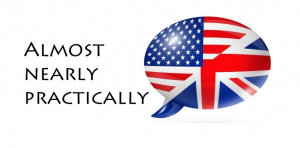Difference between revisions of "Language/English/Vocabulary/Almost-and-nearly;-practically"
m (Quick edit) |
|||
| (6 intermediate revisions by 2 users not shown) | |||
| Line 1: | Line 1: | ||
[[File:Almost nearly practically.jpg|thumb]] | |||
<div | <div class="pg_page_title"> Almost / nearly / practically</div> | ||
==Progress, measurement and counting== | ==Progress, measurement and counting== | ||
Almost and nearly can both express ideas connected with progress, measurement or counting. Nearly is less common in American English. | Almost and nearly can both express ideas connected with progress, measurement or counting. Nearly is less common in American English. | ||
Examples: | Examples: | ||
| Line 14: | Line 11: | ||
*There were almost/nearly a thousand people there. | *There were almost/nearly a thousand people there. | ||
'''Sometimes almost is a little 'nearer’ than nearly.''' | '''Sometimes almost is a little 'nearer’ than nearly.''' | ||
| Line 24: | Line 19: | ||
*It's almost ten o'clock. (= perhaps 9.57) | *It's almost ten o'clock. (= perhaps 9.57) | ||
'''Very and pretty can be used with nearly but not almost.''' | '''Very and pretty can be used with nearly but not almost.''' | ||
| Line 36: | Line 29: | ||
We can use almost to mean 'similar to, but not exactly the same’, and to make statements less definite. Nearly is not used like this. | We can use almost to mean 'similar to, but not exactly the same’, and to make statements less definite. Nearly is not used like this. | ||
Examples: | Examples: | ||
| Line 51: | Line 43: | ||
We do not usually use "nearly" before negative pronouns or adverbs like never, nobody, nothing. Instead, we use "almost", or we use "hardly" with ever, anybody, anything, etc. | We do not usually use "nearly" before negative pronouns or adverbs like never, nobody, nothing. Instead, we use "almost", or we use "hardly" with ever, anybody, anything, etc. | ||
Examples: | Examples: | ||
| Line 65: | Line 56: | ||
Examples: | Examples: | ||
She likes almost everybody. Almost anybody can do this job. | *She likes almost everybody. Almost anybody can do this job. | ||
He's been almost everywhere. He eats almost anything. | *He's been almost everywhere. He eats almost anything. | ||
==Practically== | ==Practically== | ||
| Line 77: | Line 66: | ||
Examples: | Examples: | ||
I ’ve practically finished. Jake is practically like a father to me. | *I ’ve practically finished. Jake is practically like a father to me. | ||
*She’s practically never at home. | |||
==Other Lessons== | |||
* [[Language/English/Vocabulary/About|About]] | |||
* [[Language/English/Vocabulary/Makeup|Makeup]] | |||
* [[Language/English/Vocabulary/Slang-Abbreviations|Slang Abbreviations]] | |||
* [[Language/English/Vocabulary/Also,-as-well-and-too|Also, as well and too]] | |||
* [[Language/English/Vocabulary/Alone,-lonely,-lonesome-and-lone|Alone, lonely, lonesome and lone]] | |||
* [[Language/English/Vocabulary/Alike|Alike]] | |||
* [[Language/English/Vocabulary/Phrasal-Verbs-UP!|Phrasal Verbs UP!]] | |||
* [[Language/English/Vocabulary/Geography|Geography]] | |||
* [[Language/English/Vocabulary/As-well-as|As well as]] | |||
* [[Language/English/Vocabulary/Best-1000-Things-to-Do-in-Paris|Best 1000 Things to Do in Paris]] | |||
<span links></span> | |||
Latest revision as of 10:24, 27 March 2023
Progress, measurement and counting[edit | edit source]
Almost and nearly can both express ideas connected with progress, measurement or counting. Nearly is less common in American English.
Examples:
- I've almost/nearly finished.
- There were almost/nearly a thousand people there.
Sometimes almost is a little 'nearer’ than nearly.
Compare:
- It’s nearly ten o ’clock. (= perhaps 9.45)
- It's almost ten o'clock. (= perhaps 9.57)
Very and pretty can be used with nearly but not almost.
Example:
- I've very/pretty nearly finished, (not . . . very almost . . .)
Other meanings[edit | edit source]
We can use almost to mean 'similar to, but not exactly the same’, and to make statements less definite. Nearly is not used like this.
Examples:
- Our cat understands everything - he's almost human. (not he's nearly human.)
- Her aunt’s got a strange accent. She almost sounds foreign. (not She nearly sounds foreign.)
- I almost wish I ’d stayed at home, (not I nearly wish)
- Jake is almost like a father to me.
never, nobody, nothing, etc[edit | edit source]
We do not usually use "nearly" before negative pronouns or adverbs like never, nobody, nothing. Instead, we use "almost", or we use "hardly" with ever, anybody, anything, etc.
Examples:
- She’s almost never / hardly ever at home, (not . . . nearly never . . .)
- Almost nobody / hardly anybody was there.
everybody, everything, anybody, anything, etc[edit | edit source]
We also prefer almost before everybody/ -one/-thing/-where, and almost is much more common than nearly before anybody/ -one/-thing/-where.
Examples:
- She likes almost everybody. Almost anybody can do this job.
- He's been almost everywhere. He eats almost anything.
Practically[edit | edit source]
Practically can be used in the same way as almost.
Examples:
- I ’ve practically finished. Jake is practically like a father to me.
- She’s practically never at home.
Other Lessons[edit | edit source]
- About
- Makeup
- Slang Abbreviations
- Also, as well and too
- Alone, lonely, lonesome and lone
- Alike
- Phrasal Verbs UP!
- Geography
- As well as
- Best 1000 Things to Do in Paris
